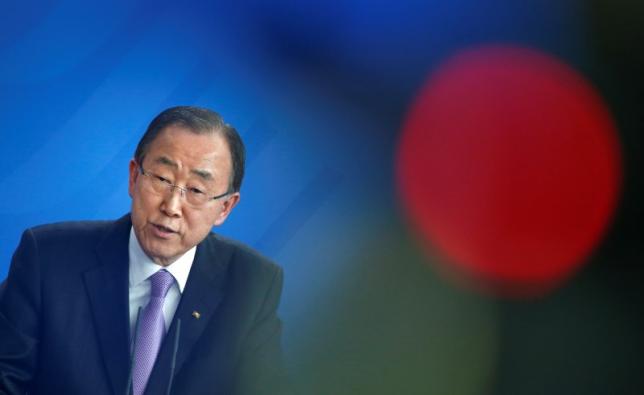Reuters
By Louis Charbonneau

United Nations Secretary-General Ban Ki-moon has scrapped plans to visit Morocco, his spokesman said on Wednesday, amid an escalating spat with Rabat over his use of the term “occupation” during a visit to the disputed territory of Western Sahara.
Morocco’s government said on Tuesday it would cut staff at the U.N. Western Sahara mission, MINURSO, and threatened to pull out of U.N. peacekeeping missions afterwhat it described as “unacceptable” comments by the U.N. chief.
That announcement came after Ban met with Morocco’s foreign minister to express his anger over remarks by the Moroccan government and a demonstration in Rabat which he said was a personal attack on him.
Ban’s spokesman Stephane Dujarric was asked if the secretary-general still intended to travel to Rabat in the near future as previously announced.
“There is no travel plan of the secretary-general,” he told reporters.
He said the loss of Morocco’s financial contributions to MINURSO, which amount to some $3 million, would have an impact on the mission. The Moroccans provide food and accommodation for the mission, which has just over 240 personnel.
“There is no talk of withdrawal of MINURSO,” Dujarric said, noting that its mandate comes from the U.N. Security Council.
Morocco also supplies peacekeepers to a number of U.N. missions.
Rabat accused Ban last week of no longer being neutral in the Western Sahara conflict, saying he used the word “occupation” to describe Morocco’s presence in the region that has been at the center of a dispute for decades.
Ban had visited refugee camps in southern Algeria for ethnic Sahrawis, who say Western Sahara belongs to them and fought a guerrilla war against Morocco until a U.N. ceasefire in 1991. Ban said he wanted to restart negotiations over the dispute.
The dispute over the Western Sahara region in the northwest edge of Africa has dragged on since Morocco took control over most of it after the withdrawal of former colonial power Spain.
The Polisario Front, which says the territory belongs to the Sahrawis, fought a war against Morocco until the ceasefire, but the two sides have since been deadlocked.
Polisario, backed by Morocco’s regional rival and neighbor Algeria and a number of other African states, wants a referendum promised in the ceasefire agreement on the region’s fate. Morocco says it will not offer more than autonomy for the region, which is rich in phosphates and possibly offshore oil and gas.
(Reporting by Louis Charbonneau; Editing by Bernard Orr)







